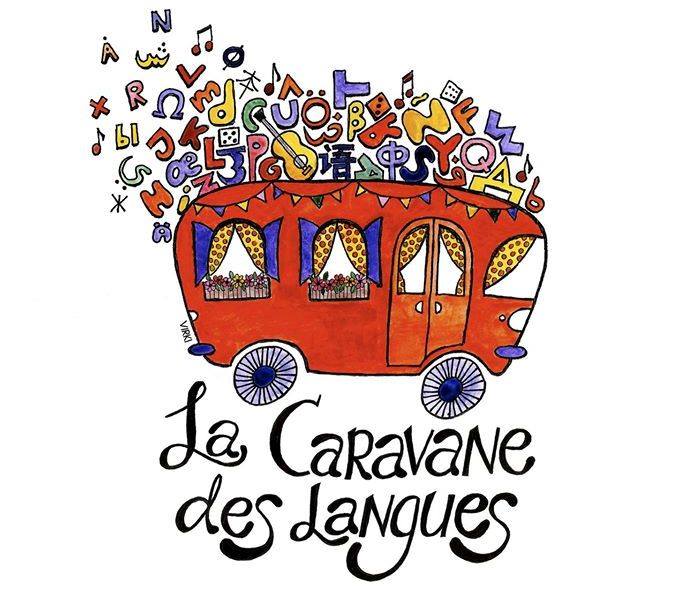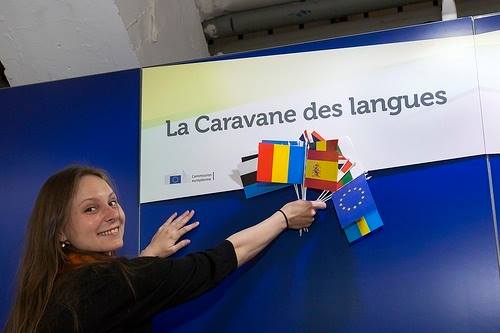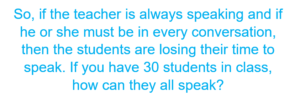
While spending a few months in Lisbon, I have seen that there are many opportunities here for foreigners, start-ups, and digital nomads (people who work remotely). I have met some brilliant people from different countries and different walks of life. There are many events for these great minds to gather, such as speakers in co-working spaces, business collaborating events, freelancer groups, and so much more. I have been fortunate to have been in a few of these events and I have always come out of them very inspired and with a new outlook on life. Such is the way for when I came across an event by Daria, where she was speaking about commitment in a Creative Mornings event in Lisbon. Daria is a TEDx-speaker, LinkedIn & Personal Branding Strategist and author. I decided to interview Daria to get to know her better and to mainly speak about language education. Here is her story.
What is your name and where are you from?
My name is Daria, I am Russian/Ukrainian, born in Russia moved to Stockholm when I was 6. But my step-father is Greek, so I had my city life in Sweden and summers in Greece. When I was 21 I moved to France.
Where do you live at the moment?
I live in Lisbon at the moment, moved here in November. Before here my partner and I were in Melbourne for a year.
What is your Educational background?
I studied European Law in Stockholm and did a ERASMUS in France. I also studies languages at the university, in Sweden as well as in France. Then I did a TEFL course, because I wanted to learn more about how to teach foreign languages to adults in the best way.
From the TEFL course I learned how to teach groups in order to activate the students, even when you are working with many people at the same time. It helped me a lot. I’m more of a pragmatic person, I love to learn new things. Right now, I’m learning how to be a best seller in amazon! I have an entrepreneurship mind, I am creative and always want to learn new things like writing a book.
Your Linkedin profile seems impressive. Can you explain some of the workshops you offer?
What I do now is help positioning high performance entrepreneurs and leaders. My clients come from different industries, such as start-ups, creatives, independent consulting. What they have in common is that they want to attract better opportunities, in terms of clients, partnerships or brand awareness. What I do is I position them online to stand out. Help them to package what they are offering, find the right clients, how to network online, how to communicate their true value, how to build a community because everything happens online nowadays. Time management is important. People get consumed by social media, because there’s so many platforms, and it feels like there isn’t enough time to deal with these. That’s why all my trainings include a part that has to do with time management, for my clients to get more work done. (http://www.dariav.com/)

I was drawn to you mainly for the Language Caravan you founded. Can you share what it is?
When I was 21, I moved to France and after the TEFL course I started teaching languages. I opened my own language school and I had it for 5 years. My partner speaks 12 languages, he is hyper polyglot. So with him we developed our own language method, I was speaking 5 and he was speaking 12. I speak Russian, Swedish, English, French, and Greek. And my partner Sebastien is a communication coach.
So we took our brains together and we started to teach and train with our own methods to teach languages. We were invited to share our methods in schools, companies and other places, we even trained teachers. We did not want to have employees because if I had employees I’d lose connections with my students. As I wanted to work with a team, and share ideas with other language enthusiasts, we decided to open a non-for profit organization. That is how the Language Caravan came into place. We decided to open up for a conversation about language learning and language learning and how it could be perceived differently.The first year we were three people involved, soon five and the team grew to about 15 volunteers in the third year. They all came from different backgrounds, such as journalism, theater, educational systems and marketing. We experimented with language games and group activities, that was a mix between languages and discoveries about different cultures and countries.
It is a connection in a human language, in a deeper way. Language is identity. For example, When I speak Greek it makes me connect with those memories.

How does the Language Caravan work now?
In the beginning, we created group workshops from anywhere between 8 to 30 people. The schools were intrigued by our concept, but we wanted to experiment with bringing the language experience outside of a educational environment, and bring it to, in squares, in festivals, parks, etc. We did this all over France. We were invited in language celebrations, when they celebrated local languages based on regions. It is hard to explain without experiencing it but imagine people in groups of 8 to 30, who have never met each other and don’t speak the same language, play together. Using verbal language, body language, sounds, etc. All in a fun activity way. It was our space to create a language experience. 100% non-profit, to rethink education and rethink language and create with others.
Its still active. It is all run by volunteers. I’m very happy about this. It’s my linguistic footprint. Its great to see it is still continuing. In fact, after our second year we have a radio show, bi-monthly language show. In the radio show, the volunteers pick different themes around languages and cultures each month. It can be a country, a language, but also playing with words with improv actors, slammes, musicians etc. It is a space for creation.
Anyone can learn a language in 3 months, but it needs to be your inner motivation, what you really want. Not because you have to for a job or what other reason. When I moved to France I was committed to learn a lot of the French language in 3 months. I took away everything else, I committed myself 100% on the language. I was studying in the university in French, but every time I was thinking why I am I doing this, who am I doing this for. My true motivation was to run my own company living in France, and for that I needed to learn French. So I did it for me for all the benefits I would gain for this language. That’s what stands out in our language philosophy, we do goals. For example, my goal is in 3 months to have learned this language. If you really want to there is a way to learn.

Could you share some examples and what you have learned from language learning?
Here is an example story. I met this guy in Bali last year, and he was traveling around the world. When he heard my partner and I speak many languages he says: “I have been travelling around the world, keeping my books to learn Spanish with me in the bag pack. I should be learning it, but I can’t get myself to do it. I feel like it should be good, but I’m not doing it.” I asked him why he was insisting to learn it straight at that point in Bali, when he clearly hadn’t any specific wish to do so, as he was kind of forcing himself to do it “because it would be good to learn some more Spanish”.
It’s good to put a language goal, to commit to your learning. But don’t push yourself if it’s not the right time, or maybe the right context for it.
So he thought about it and decided to wait, and when he later planned his trip to Spain, he picked it up with much more pleasure a couple of month prior the trip. Because at that stage he had a real need for it, a true motivation. Create the goal, but don’t make yourself feel bad because you’re not learning in Bali. There’s no context for it. So he stopped. But of course, when he was in Spain he picked it up. If there’s a spark and a wish, a reason for personal grown, then they will learn. This is the main lesson I have learned from my experience in teaching and training for learning languages.
Language coaching is very effective for people if you have a specific goal. This was working really well for my clients. Let’s imagine an example; let’s say that you are a vet and you need to go to an annual convention about dogs in Portugal. The convention will party be held in Portuguese, and the date is in three months time. So what we would do here is that we would be focusing on that specific occasion and learn everything you would need to be able to attend that convention and make use of your Portuguese in that specific context. This is just an invented example, but you get the idea.Have a specific intention of your learning experience. Do reverse engineering, this is my goal what do I need to make it happen. Then after you accomplish that you can move on to the next goal you can add because of this language. It must be small and specific, not like I want to be fluent, you will get there eventually, but not yet, you need to begin with a goal for the first step.
Lastly, we need to add games to our learning experience. We all love playing and games. We all have our inner child. To bring joy and fun and laughing. Board games and theater games and anything you can bring to make it enjoyable. You can use different ways, such as sounds, words, body language, etc. We are all different learners, so you need to find ways to please every type of learner in the room. It’s hard to generalise, but growing up, I remember that our language classes were mostly focusing on the logical part of our learning intake, such as grammar and charts, lots of text, writing and so on. Group dynamics are also important. So if the teacher is always speaking and if he or she must be in every conversation, then the students are losing their time to speak. So how can create more speaking time for each student in larger classrooms, where sometimes there are up to 30 students? What we can work with here is breaking up the class into smaller groups by moving around the tables and creating exercises where they can be up to 4 people in each group, meaning that there are at least 5 people speaking at the same time. When I studied the TEFL course, I remember my instructor to not give more then 20 minutes of theory in a 60 minutes lesson. The remaining time was used to activate the students to practice what I just taught them. And I apply this in all my training. How to make sure to make people interact and train in the classroom to apply what they are learning. I have done this in groups of 100 people, by organizing it in speaking engagements.
Thank you Daria for sharing your story and insights in language education.
To know more about the Language Caravan, visit their site
(https://caravanedeslangues.wordpress.com/)
or their Facebook page for upcoming events
(https://www.facebook.com/lacaravanedeslangues/)
Learning languages is not an easy task. Just like Daria, I am always trying to learn new ones. At this moment I am learning Portuguese and Turkish. I have learned most of my other languages “on the streets” as I say, without taking courses. I learned Italian through TV and learned Spanish by traveling and working on cruises. As Daria mentions, depending on the reason you are learning, you take the necessary steps to learn that language. I always wanted to learn for traveling purposes, and to connect to locals in the different countries I have lived.
For me, maybe I do not know very well how to write in these languages but I can still say I speak fluently, and always try to improve on those skills. Now I can say I am fluent in 4, Albanian, English, Italian, Spanish and learning Portuguese and Turkish. But it doesn’t stop here, I can understand a lot of French, have learned bits of Serbo-Croatian, Russian, Greek, Romanian and even Mandarin, even though this last one I found to be the most difficult so far. I am very interested to learn more Asian languages, and soon will tackle Japanese. Daria’s story inspired me to look at language learning differently.
